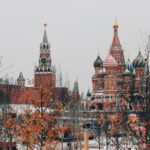
The city of Moscow is already facing its first major legal challenge after launching a city-wide surveillance network on January 1. The network is managed by Moscow’s Department of Technology (DIT), which has spent 3.3 billion roubles (approximately $53.3 million) installing cameras and licensing facial recognition software to bring the network online.
The legal challenge comes from Alena Popova, Vladimir Milov, and Amnesty, who are seeking to have the technology banned at protests and other mass events. Popova is a lawyer and an activist, while Milov is the leader of the opposition Solidarnost party. The pair argue that the Moscow network is an illegal surveillance operation that infringes on people’s civil rights.
This is the second time that Popova has filed a lawsuit against the DIT. She was previously fined for participating in a protest in Moscow in 2018, and claims that she was only identified with the use of facial recognition. That lawsuit was dismissed in November.
The facial recognition technology being used in the cameras comes courtesy of NtechLab, which landed an exclusive contract worth 200 million roubles. NtechLab is best known for creating the controversial FindFace app that allowed users to track people down on social media.
Both NtechLab and the DIT stated that they do not store any personal information, with the DIT claiming that all footage is deleted after five days, barring a request from law enforcement. However, the plaintiffs argue that they have no way of knowing if those guidelines are being followed, especially in light of prior abuses by the Russian government.
“Facial recognition technology is by nature deeply intrusive,” said Amnesty International Russia Director Natalia Zviagina. “In the total absence of transparency and accountability, it is likely to take reprisals against peaceful protest to an entirely new level. It is telling that the government has provided no explanation as to how it will ensure the right to privacy and other human rights, nor has it addressed the need for public oversight of such powerful technologies.”
The lawsuit comes shortly after the European Union scrapped plans for a temporary ban on the public use of facial recognition, and the exposure of a massive facial recognition database in the United States. Moscow’s network will eventually consist of 200,000 cameras, of which 175,000 have been installed.
Sources: BBC, The Guardian
–
January 31, 2020 – by Eric Weiss






Follow Us